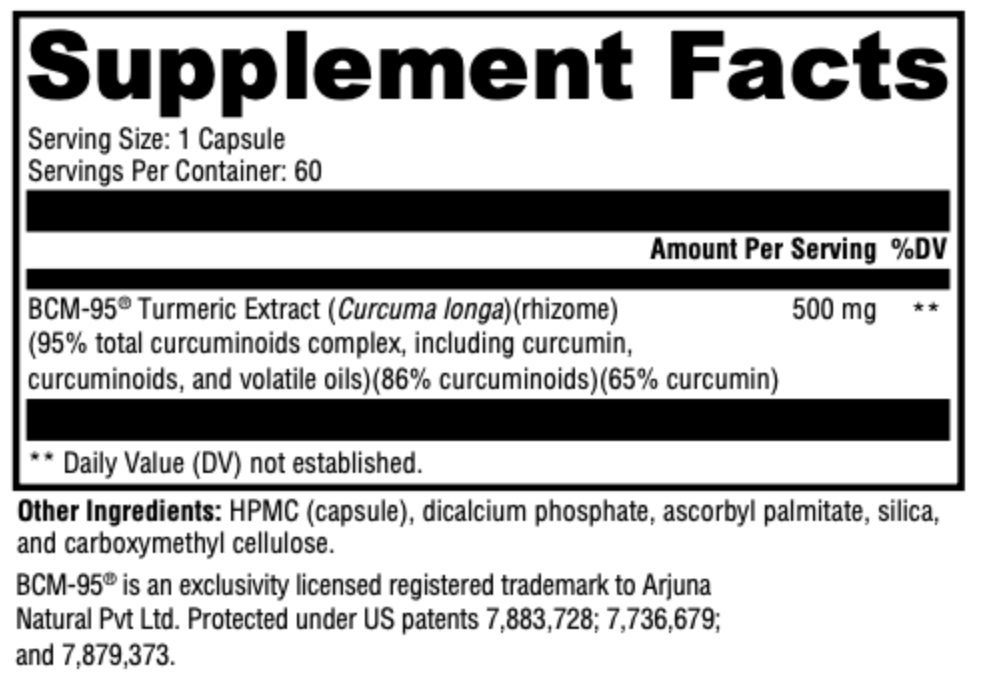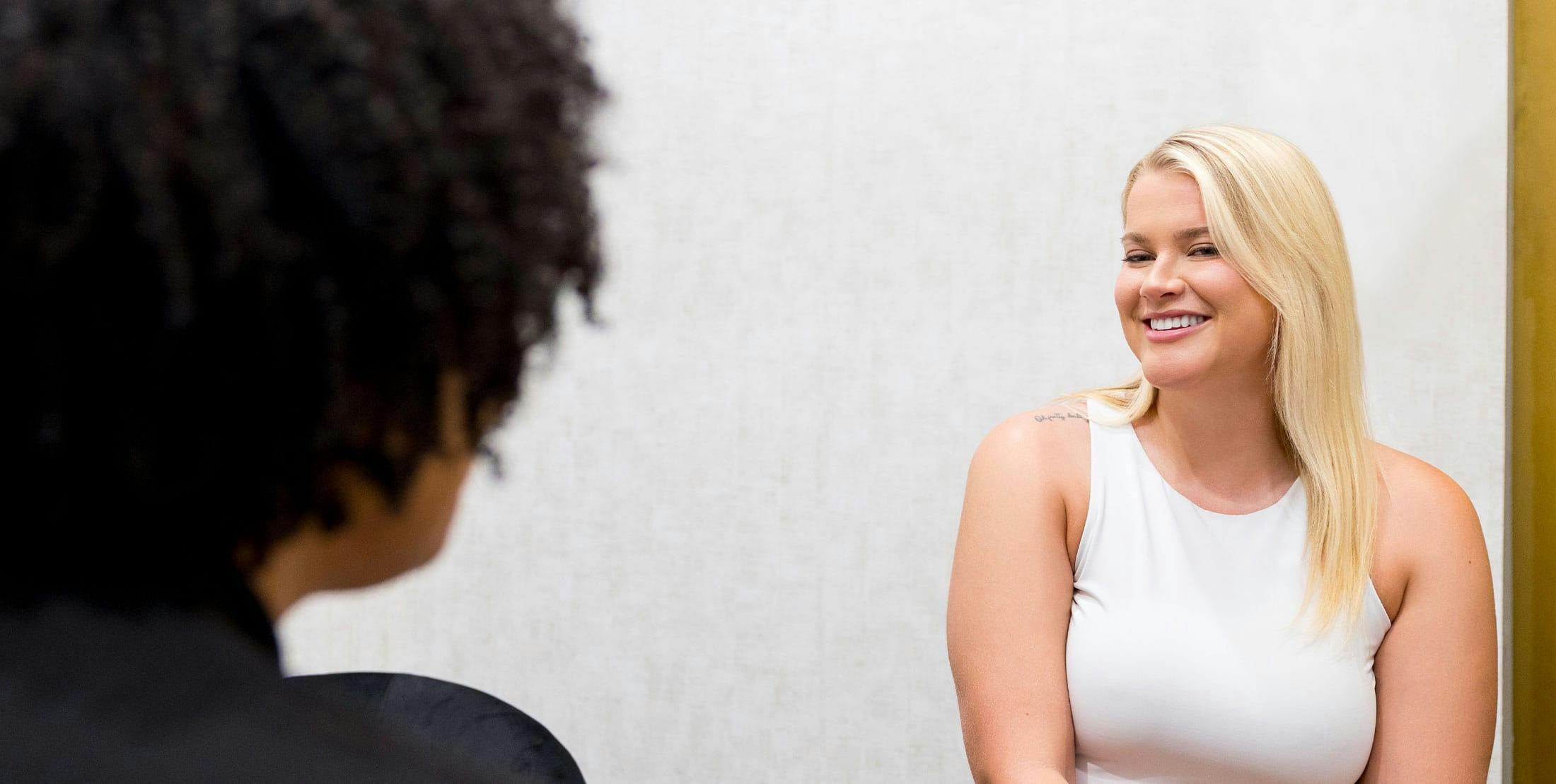Sero-Curcumin
Clinical Applications
- Provides Antioxidant and Cell-Protective Activity*
- Supports Joint Health and Helps Relieve Minor Pain Associated With Physical Activity*
- Supports the Health of Organs and Systems by Modulating the Production of Cytokines and Other Signaling Molecules*
- Supports the Body’s Efforts to Promote Healthy Cell Growth and Inhibit Unhealthy Cell Growth in Certain Cell Lines*
- Supports Brain/Neuronal Health and a Healthy Mood*
- Supports a Healthy Microbial Environment*
Sero-Curcumin features BCM-95®—a 100% pure turmeric extract standardized to curcumin, demethoxycurcumin, bisdemethoxycurcumin, and essential oils of turmeric rhizome. This natural composition optimizes bioavailability and reflects true turmeric identity to deliver optimal health benefits. BCM-95 has been extensively studied and shows broad efficacy without the use of phospholipids, excipients, additives, carriers, nanotechnology, or bioenhancers.*
All Serotonin Nutraceuticals LLC. Formulas Meet or Exceed cGMP Quality Standards
Discussion
Curcumin, the principal curcuminoid in turmeric, has been the subject of vast research in recent years. The pleiotropic nature of curcumin’s biological effects makes it an interesting compound to researchers who study common chronic health concerns, such as those associated with joints, the cardiovascular system, glucose metabolism, brain function, mood, and cell-cycle regulation.^[1-6]
The mechanisms underlying curcumin’s effects are diverse and have not been fully elucidated, but it is known that curcumin has powerful antioxidant activity and that it has multiple molecular targets, including transcription factors, cell cycle proteins, cytokines, chemokines, enzymes (e.g., COX-2), receptors, and adhesion molecules.^[7] These effects make curcumin applicable to a wide array of clinical presentations.*
Patented Formulation: BCM-95®
While the beneficial effects of curcumin are hardly arguable, an area of intense research is how to make curcumin more bioavailable. Poor absorption in the gastrointestinal (GI) tract, rapid metabolism, and rapid systemic elimination are characteristics of commercially available curcumin preparations. While investigating a way to overcome these challenges, scientists discovered they could take advantage of the synergism between the curcuminoids and the sesquiterpenoids (essential oils) naturally present in turmeric.^[7] This discovery resulted in the development of BCM-95—a 100% natural whole turmeric extract composed of 86% curcuminoids (curcumin, demethoxycurcumin, and bisdemethoxycurcuminoid) and 7%-9% essential oils.*
Essential oils are a natural component of the turmeric rhizome. Not only do they enhance absorption of curcuminoids, but they also impart health benefits.^[8-10] The essential oils found in BCM-95 are extracted using double steam distillation. Essential oils comprise 7% to 9% of turmeric, with 50% of that being ar-turmerone, alpha-turmerone, and beta-turmerone. Some of the other essential oils present in BCM-95 include ar-curcumene, alpha-curcumene, zingiberene, beta-sesquiphellandrene, beta-atlantone, and germacrone.*
The Bioavailability of BCM-95
Animal and human studies have demonstrated the superior bioavailability of the BCM-95 curcumin composition.^[7,11,12] In a pilot crossover study, Antony et al compared the bioavailability of three forms of curcumin: BCM-95, normal curcumin, and a non-controlled release curcumin-piperine-lecithin formula. The data demonstrated that the absorption of curcumin from BCM-95 was fast, peaked at 4.5 hours with a gradual decline, and that curcumin was still detectable in the blood at eight hours. The other formulas showed slower curcumin absorption with an earlier peak and rapid disappearance from the blood after 4.5 hours. The relative bioavailability of BCM-95 was approximately 6.93-fold higher than normal curcumin and 6.3-fold higher than the non-controlled release curcumin-lecithin-piperine formula. According to the researchers, the results of this study indicate that the BCM-95 curcumin is “absorbed early and retained longer” compared to other forms.^[7]
Unlike other bioavailability-enhanced curcumin formulas, BCM-95 does not contain any non-turmeric compounds; no phospholipids, excipients, additives, carriers, nanotechnology, or bioenhancers are used.
BCM-95 Studies
To date, BCM-95 is backed by more than 21 published studies and over 12 years of research conducted around the world. Unlike many commercially available curcumin formulas, the bioavailability, safety, and efficacy of BCM-95 curcumin has been demonstrated in numerous preclinical and human studies. The following areas illustrate the massive body of research behind BCM-95 in relation to common health concerns: colon health^[13-17], mood and stress^[5,18-20], cognitive health^[8], joint health^[8,21], urinary health^[22], cytokine modulation^[23,24], prostate health^[25-27], breast health^[28], and cardiovascular health.^[29]
As an example of the findings, in an eight-week randomized, double-blind, placebo-controlled trial (n=56), ingestion of 500 mg BCM-95 twice daily resulted in significant improvements in mood-related parameters during weeks four to eight.[20] These findings are supported by related research into curcumin’s effect on mood.^[18,19] In another study, the effects of BCM-95 on joints were evaluated. The BCM-95 group (500 mg for eight weeks) showed the highest percent of improvement in scoring related to joint health and comfort.^[2]
In addition to the aforementioned published studies, eight human clinical trials using BCM-95 for periods of 21 days to one year are currently underway at prestigious institutions, including several at Baylor University Medical Center at Dallas.
Safety and Dosing
Turmeric has been safely consumed for thousands of years, and its medicinal compound curcumin has an outstanding safety profile. Phase I clinical trials using up to 8 g/d for four months did not result in discernable toxicities.^[30] Mild gastrointestinal distress can sometimes accompany curcumin supplementation, but this may be minimized by consuming the supplement with food. Current doses in clinical trials using BCM-95 range from 500 mg/d to 1000 mg/d.*

Directions
Take one capsule twice daily, or as directed by your healthcare practitioner.
Consult your healthcare practitioner prior to use. Individuals taking medication, especially blood thinners or for cancer, should discuss potential interactions with their healthcare practitioner. Do not use if tamper seal is damaged.
Does Not Contain
Wheat, gluten, corn, yeast, soy, animal or dairy products, fish, shellfish, peanuts, tree nuts, egg, ingredients derived from genetically modified organisms (GMOs), artificial colors, artificial sweeteners, or artificial preservatives.
References
- Yang F, Lim GP, Begum AN, et al. Curcumin inhibits formation of amyloid beta oligomers and fibrils, binds plaques, and reduces amyloid in vivo. J Biol Chem. 2005 Feb 18;280(7):5892-901. [PMID: 15590663]
- Chandran B, Goel A. A randomized, pilot study to assess the efficacy and safety of curcumin in patients with active rheumatoid arthritis. Phytother Res. 2012 Nov;26(11):1719-25. [PMID: 22407780]
- Garcea G, Berry DP, Jones DJ, et al. Consumption of the putative chemopreventive agent curcumin by cancer patients: assessment of curcumin levels in the colorectum and their pharmacodynamic consequences. Cancer Epidemiol Biomarkers Prev. 2005 Jan;14(1):120-5. [PMID: 15668484]
- Goel S, Banerjee S, Aggarwal BB. The beneficial role of curcumin in inflammation, diabetes and neurodegenerative disease: A recent update. Food Chem Toxicol. 2015 Sep;83:111-24. [PMID: 26066364]
- Sanmukhani J, Satodia V, Trivedi J, et al. Efficacy and safety of curcumin in major depressive disorder: a randomized controlled trial. Phytother Res. 2014 Apr;28(4):579-85. [PMID: 23832433]
- Baum L, Lam CW, Cheung SK, et al. Six-month randomized, placebo-controlled, double-blind, pilot clinical trial of curcumin in patients with Alzheimer disease. J Clin Psychopharmacol. 2008 Feb;28(1):110-3. [PMID: 18204357]
- Antony B, Merina B, Iyer VS, et al. A pilot cross-over study to evaluate human oral bioavailability of BCM-95CG (Biocurcuma), a novel bioenhanced preparation of curcumin. Indian J Pharm Sci. 2008 Jul-Aug;70(4):445-9. [PMID: 20046768]
- Honda K, Aoki F, Tanaka H, et al. Effects of ingestion of the extract of Curcuma longa on glucose and lipid metabolisms in obese diabetic mice: a DNA microarray study. J Agric Food Chem. 2006 Nov 29;54(24):9055-62. [PMID: 17117890]
- Singh V, Jain M, Misra A, et al. Curcumin ameliorates insulin resistance & associated thrombotic complications in hamster & rat. Indian J Med Res. 2015 Jun;141(6):823-32. [PMID: 26205062]
- Nishiyama T, Mae T, Kishida H, et al. Curcuminoids and sesquiterpenoids from turmeric (Curcuma longa L.) suppress an increase in blood glucose level in type 2 diabetic KK-Ay mice. J Agric Food Chem. 2005 Feb 23;53(4):959-63. [PMID: 15713055]
- Shishu M. Comparative bioavailability of curcumin, turmeric and Biocurcuma™ in traditional vehicles using non-reverted rat intestinal sac model. J Funct Foods. 2010; 2(1):60-65. [on file]
- Benny M, Antony B. Bioavailability of Biocurcumax™ (BCM-95™). Spice India. 2006; Sept:11-15. http://geronova.com/wp-content/uploads/2013/06/Spice_Board.pdf. Accessed September 22, 2015.
- Buhrmann C, Kraehe P, Lueders C, et al. Curcumin suppresses cross-talk between colon cancer stem cells and stromal fibroblasts in the tumor microenvironment: potential role of EMT. PLoS One. 2014 Sep 19;9(9). [PMID: 25238234]
- Shakibaei M, Buhrmann C, Kraehe P, et al. Curcumin chemoresistance chemosensitization: 5-fluorouracil resistant MMR-deficient human colon cancer cells in high density cultures. PLoS One. 2014 Jan 15;9(1). [PMID: 24404203]
- Goel A, Chang DK, Wash JD, et al. Curcumin inhibits the activation of E-cadherin-β-catenin pathway and reduces chemoresistance in human colon cancer cells. Carcinogenesis. 2005 Mar;26(3):503-15. [PMID: 15695502]
- Toden S, Okugawa Y, Buhrmann C, et al. Novel evidence for curcumin-induced chemoprevention through regulation of mir-34a and mir-27a in colorectal cancer. Epigenetics (Phila). 2015 May;5(8):413-31. [PMID: 25725106]
- Shakibaei M, Buhrmann C, Kraehe P, et al. Curcumin suppresses 5-fluorouracil resistant MMR-deficient human colon cancer cells in high density cultures. PLoS One. 2014 Jan 15;9(1). [PMID: 24404203]
- Sanmukhani J, Anovadiya A, Tripathi CB. Evaluation of antidepressant-like activity of curcumin and its combination with fluoxetine and imipramine: an acute and chronic study. Acta Pol Pharm. 2011 Sep-Oct;68(5):769-75. [PMID: 21928724]
- Lopresti AL, Maes M, Meddens MJ, et al. Curcumin and major depression: a randomised, double-blind, placebo-controlled trial investigating the potential of peripheral biomarkers to predict treatment response and antidepressant mechanisms of change. Eur J Nutr. 2015 Jan;25(1):38-50. [PMID: 25523843]
- Lopresti AL, Maes M, Maker GL, et al. Curcumin for the treatment of major depression: a randomised, double-blind, placebo-controlled study. J Affect Disord. 2014;167:368-75. [PMID: 25046621]
- Khajehdehi R. Clinical evaluation of a formulation containing Curcuma longa rhizome extracts in the management of knee osteoarthritis. Mod Med Rep. 2013 Nov;8(5):144-8. [PMID: 24004231]
- Hejazi J, Rastmanesh R, Foroughi-Azam T, et al. A pilot clinical trial of the protective effects of curcumin supplementation in patients with prostate cancer. J Cancer Sci Ther. 2013;5(10):320-24. http://www.omicsonline.org/a-pilot-clinical-trial-of-radio-protective-effect-of-curcumin-supplementation-in-patients-with-prostate-cancer-1948-5956.1000222. [PMID: 252295]
- Leray V, Freuchet B, Le Bloch J, et al. Effect of citrus polyphenols-rich curcumin extract on inflammatory state in obese cats. Br J Nutr. 2011 Oct;106 Suppl 1. [PMID: 22005413]
- Motard-Burga S, Escarvage S, Chopra R, et al. The effect of exercise and nutritionally-enhanced curcumin on inflammatory cytokine expression in young racehorses during training. Equine Vet Sci. 2017; 36(2):328-35. http://www.equineutraceuticals.com/final-written-paper-with-back.pdf. Accessed September 22, 2015.
- Su YJ, Ma ZQ, Zeng HM, et al. Curcumin induces apoptosis of lung cancer A549 cells via the generation of ROS and activation of caspase cascade genes. Integr Cancer Ther. 2015 Jan;9(1):86-96. [PMID: 25774444]
- Jiang J, Eliaz I, Sliva D. Synergy of growth and invasive behavior inhibition by ProstaCaid®: a mechanism of activity. Int J Oncol. 2011 Jun;38(6):1675-82. [PMID: 21369745]
- Jiang J, Loganathah J, Eliaz I, et al. ProstaCaid inhibits growth of human prostate cancer. Int J Oncol. 2012 May;40(5):1339-44. [PMID: 22293856]
- Jiang J, Wojnowski L, Rides J, et al. Suppression of inflammatory cytokine and matrix degradation enzyme expression by dietary supplement BreastDefend®. Integr Cancer Ther. 2011 Sep;10(9):192-200. [PMID: 20926764]
- Baum L, Cheung SK, Mok VC, et al. Curcumin effects on blood lipid profile in a 6-month human study. Pharmacol Res. 2007 Dec;56(6):509-14. [PMID: 17951067]
- Cheng AL, Hsu CH, Lin JK, et al. Phase I clinical trial of curcumin, a chemopreventive agent, in patients with high-risk or pre-malignant lesions. Anticancer Res. 2001 JulAug;21(4B):2895-900. [PMID: 11712783]
These statements have not been evaluated by the Food and Drug Administration. This product is not intended to diagnose, treat, cure, or prevent any disease.
Download Sero-Curcumin PDF

